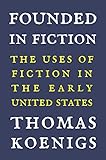Founded in Fiction : The Uses of Fiction in the Early United States / Thomas Koenigs.
Material type: TextPublisher: Princeton, NJ : Princeton University Press, [2021]Copyright date: ©2021Description: 1 online resource (336 p.)Content type:
TextPublisher: Princeton, NJ : Princeton University Press, [2021]Copyright date: ©2021Description: 1 online resource (336 p.)Content type: - 9780691188942
- 9780691219820
- American fiction -- 18th century -- History and criticism -- Theory, etc
- American fiction -- 19th century -- History and criticism -- Theory, etc
- Literature and society -- United States -- History -- 18th century
- Literature and society -- United States -- History -- 19th century
- Politics and literature
- Social problems in literature
- LITERARY CRITICISM / American / General
- Arthur Gordon Pym
- Jacksonian
- Sheppard Lee
- Uncle Tom’s Cabin
- antebellum
- classic
- development of American novel
- early American literature
- female conduct
- history of the novel
- inner life
- leisure
- literary history
- literary hoaxes
- novelization
- slave interiority
- slave narrative
- slave narratives
- slavery
- social activity
- theory of the novel
- 813/.209
- online - DeGruyter
| Item type | Current library | Call number | URL | Status | Notes | Barcode | |
|---|---|---|---|---|---|---|---|
 eBook
eBook
|
Biblioteca "Angelicum" Pont. Univ. S.Tommaso d'Aquino Nuvola online | online - DeGruyter (Browse shelf(Opens below)) | Online access | Not for loan (Accesso limitato) | Accesso per gli utenti autorizzati / Access for authorized users | (dgr)9780691219820 |
Frontmatter -- contents -- Introduction -- PART I -- chapter 1 The Problem of Fictionality and the Nonfictional Novel -- chapter 2 Republican Fictions -- chapter 3 Fictionality and Female Conduct -- PART II -- chapter 4 The Shifting Logics of Historical Fiction -- chapter 5 Hoaxing in an Age of Novels -- chapter 6 Fictionality and Social Criticism -- chapter 7 Fictionality, Slavery, and Intersubjective Knowledge -- Coda: Romance and Reality in the 1850s and Beyond -- Acknowledgments -- Notes -- Index
restricted access online access with authorization star
http://purl.org/coar/access_right/c_16ec
An original account of the importance of diverse forms of fiction in the early American republic—one that challenges the “rise of the novel” narrativeWhat is the use of fiction? This question preoccupied writers in the early United States, where many cultural authorities insisted that fiction-reading would mislead readers about reality. Founded in Fiction argues that this suspicion made early American writers especially attuned to one of fiction’s defining but often overlooked features—its fictionality. Thomas Koenigs shows how these writers explored the unique types of speculative knowledge that fiction could create as they sought to harness different varieties of fiction for a range of social and political projects.Spanning the years 1789–1861, Founded in Fiction challenges the “rise of novel” narrative that has long dominated the study of American fiction by highlighting how many of the texts that have often been considered the earliest American novels actually defined themselves in contrast to the novel. Their writers developed self-consciously extranovelistic varieties of fiction, as they attempted to reform political discourse, shape women’s behavior, reconstruct a national past, and advance social criticism. Ambitious in scope, Founded in Fiction features original discussions of a wide range of canonical and lesser-known writers, including Hugh Henry Brackenridge, Royall Tyler, Charles Brockden Brown, Leonora Sansay, Catharine Maria Sedgwick, Edgar Allan Poe, Robert Montgomery Bird, George Lippard, Harriet Beecher Stowe, Frederick Douglass, and Harriet Jacobs.By reframing the history of the novel in the United States as a history of competing varieties of fiction, Founded in Fiction shows how these fictions structured American thinking about issues ranging from national politics to gendered authority to the intimate violence of slavery.
Mode of access: Internet via World Wide Web.
In English.
Description based on online resource; title from PDF title page (publisher's Web site, viewed 25. Jun 2024)


